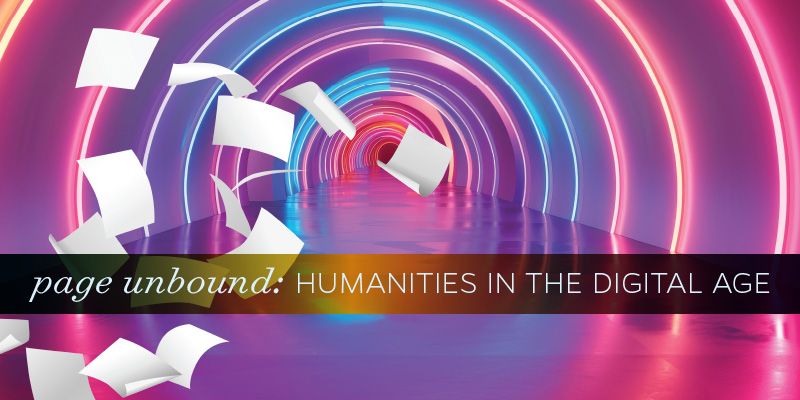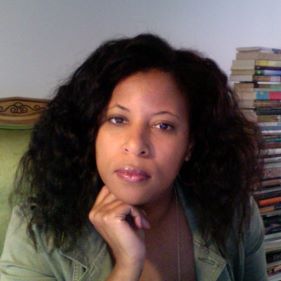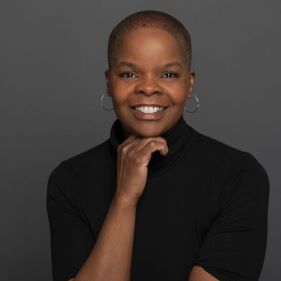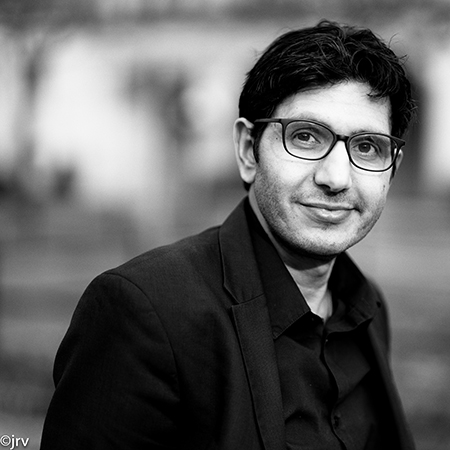
Speaker Series 2024-25
The UF Center for the Humanities and the Public Sphere invites you to the 2024-2025 speaker series Page Unbound: Humanities in the Digital Age, a dynamic exploration of how digital technologies intersect with the humanities to shape our understanding of knowledge, identity, and ethics in the modern world.
This series brings together leading scholars to address the evolving relationship between technology and the humanities, offering fresh perspectives on the challenges and opportunities presented by digital tools, AI, and computational approaches.
This series is sponsored by:
- Center for Arts, Migration, and Entrepreneurship
- College of Liberal Arts and Sciences
- George A. Smathers Libraries
SPEAKERS
Spring 2025

Marisa Parham, PhD, Professor of English and Digital Studies, University of Maryland at College Park
Title: “Black Living and Other Computational Poetics”
Date: Thursday, February 6
Time: 4 – 5:30
Location: Smathers 100
Sponsored by: African American Studies Program
RSVP to attend
Pre-Talk Workshop
Talk Description: By looking at select works by James Baldwin, Toni Morrison, and Harryette Mullen, this talk develops a consideration of Black knowing as a kind of temporal experience, one that helps us think about what must always yet can never be artificial about computation and other human-machine relationships.
Workshop Description: In this interactive workshop, Dr. Parham will share her process for navigating and creating digital scholarship, offering invaluable insights for faculty and graduate students who are curious about integrating digital tools into their research. Using a real-world example of a digital project, Dr. Parham will demystify the process of conceptualizing, designing, and implementing experimental digital research. Whether you’re new to digital humanities or looking to expand your expertise, this workshop will provide the tools and inspiration to take your scholarship to the next level.
Marisa Parham is a Professor of English and Digital Studies at the University of Maryland, College Park, where she directs the African American Digital and Experimental Humanities initiative (AADHUM) and NarraSpace, a storytelling lab centered on BIPOC experiences. She is also an associate director at the Maryland Institute for Technology in the Humanities (MITH) and holds affiliate faculty appointments in African-American and Africana Studies, in the Harriet Tubman Department of Women, Gender, and Sexuality Studies, the program in Immersive Media and Design, and in the program in Comparative Literature. Her work explores texts and technologies that challenge ideas of time, space, and materiality, particularly in African American literature and culture. Notable projects include the digital-interactive essay .break .dance, and “Sample | Signal | Strobe: Haunting, Social Media, and Black Digitality.” Parham is currently developing a digital-interactive narrative on memory and technology, and ConvocationAR, an XR-driven project.

Lyneise Williams, PhD, Associate Professor of Art History, University of North Carolina Chapel Hill
Title: “Technology, Rethinking, and Claiming our Time”.
Date: Wednesday, March 5
Time: 4 – 5:30
Location: Smathers 100
Sponsored by: Harn Museum of Art
RSVP to attend
Pre-Talk Workshop
Talk Description: We often take aesthetics, appearances, and representations for granted—yet they shape our perceptions of power, politics, and success in profound ways. Technology is often seen as a neutral tool, but its role in image-making is anything but impartial. In this talk, Lyneise Williams traces the evolving representations of Black athletes from the early 20th century to today, beginning with the striking 1927 photograph of Black Panamanian boxer Alphonso Teofilo Brown in Match L’Intran. Examining photography, newspaper printing, microfilming, digitization, and AI, she reveals how technological choices shape and obscure cultural narratives. From sports media to advertising and social media, Williams explores how humanities perspectives can challenge assumptions of neutrality, offering deeper insights into identity and representation in the digital age.
Workshop Description: Is technology truly neutral? What hidden values and assumptions shape the digital spaces we engage with every day? This interactive workshop challenges the idea of technological neutrality by turning a critical eye toward Minecraft—not as a game to be played, but as a cultural and material object that reflects human beliefs, biases, and omissions. Rather than focusing on gameplay, Williams invites participants to analyze Minecraft as a space created by humans and shaped by human interactions. Through small group discussions, participants will examine themes such as:
- The game’s rules and mechanics
- How people and environments are represented (or not)
- The roles and agency given to players
- The language and terminology used
Each group will present their findings, leading to a collaborative discussion that challenges assumptions about neutrality in technology. By interrogating Minecraft’s design choices, we will explore ways to rethink and intentionally integrate fuller representations of humanity within tech-designed spaces.
Lyneise Williams is an Associate Professor of Art History at the University of North Carolina at Chapel Hill (PhD, Yale 2004). She is the author of Latin Blackness in Parisian Visual Culture, 1852-1932 (2019), which explores how Parisian visual culture linked blackness to Latin American identity from the mid-19th to early 20th century through figures like Cuban entertainer Chocolat and Panamanian boxer Alfonso Teofilo Brown. Her current book examines beauty, fashion, and the Black male athletic body in 1920s-30s Paris, while a third project focuses on trauma, care, and African American spirituality in 1920s South Carolina. A former Getty Scholar Fellow, she has published on Uruguayan artist Pedro Figari, African art, and hip-hop jewelry. Williams also serves on the Chief Justice Advisory Commission on Portraits and has curated African art exhibitions, including contributing to the North Carolina Freedom Monument Project.

Alexander Gil Fuentes, PhD, Senior Lecturer II & Associate Research Faculty of Digital Humanities, Yale University
Title: “From Columbus to Google: Evolving Architectures of Knowledge”
Date: Thursday, March 27
Time: 4 – 5:30
Location: Smathers 100
Sponsored by: Spanish and Portuguese Studies
RSVP to attend
Talk Description: Modern libraries and archives cannot be understood without steady reference to the history of European conquest and colonial expansion. In the 21st century, we are as likely to mourn its evident gaps and silences as to rejoice in its feats of accumulation. Scholars today train to read between the lines, against the grain, to mind the gaps, even to critically fabulate in order to be able to reconstruct the lived world and knowledges lost in the wake of European genocide and erasure. Not far from his father’s desire to see and own all, Ferdinand Columbus imagined and went out of his way to build a universal library of all that was known and could be known. We begin our analysis here, at the encounter, when cosmography and bibliography seem to collapse into each other, driven by the Euro-Christian will to conquer. We end in the present, when companies like Google, Microsoft, OpenAI, Clarivate and other specific actors have gained enormous power through their ability to aggregate, index and manipulate massive corpora; now, when the cultural and historical record of humanity has become a hybrid construct, part analog, part digital; but also when so- called generative AI begins to make its hallucinatory contributions to that very record. How do we even begin to understand the gargantuan history of the de facto historical record itself? How do we understand it as both product and producer of history? In this talk, I propose a few tentative approaches to help us make sense of this vast trajectory. Focusing on textuality, I conclude by advocating for increased attention to the infrastructures that prop the historical and cultural record today.
Workshop Description: Explore how knowledge systems have evolved over centuries, from early exploration to the digital age, and discover new ways to think about the past, present, and future of information. This workshop offers a unique opportunity to engage with innovative ideas and connect with others interested in the humanities and digital scholarship.
Alexander Gil Fuentes is a Senior Lecturer II and Associate Research Faculty of Digital Humanities in the Department of Spanish and Portuguese at Yale University, where he teaches introductory and advanced courses in digital humanities, and runs project-based learning and collective research initiatives. His research interests include Caribbean culture and history, digital humanities and technology design for different infrastructural and socio-economic environments, and the ownership and material extent of the cultural and scholarly record. He is currently senior editor of archipelagos journal, editor of internationalization of Digital Humanities Quarterly, co-organizer of The Caribbean Digital annual conference, and co-principal investigator of the Caribbean Digital Scholarship Collective, funded by the Andrew W. Mellon foundation.